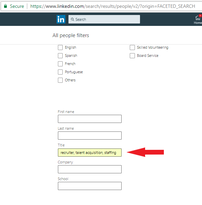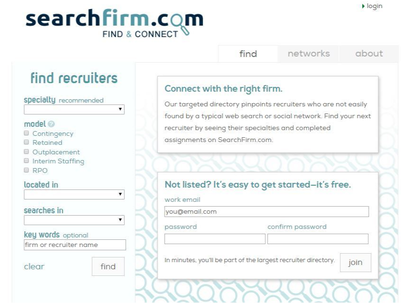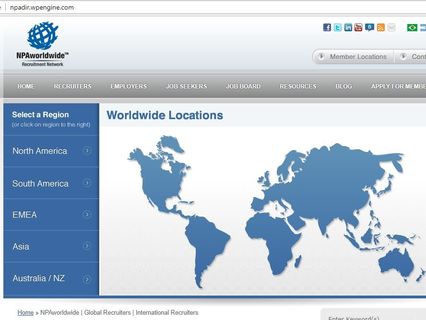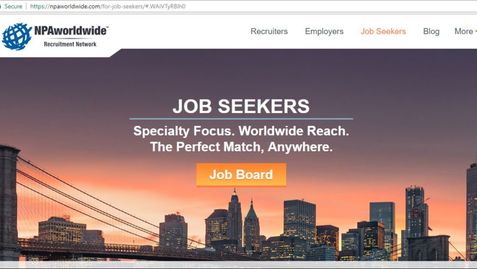Work With a Recruiter to Diversify Your Job SearchKeep your career on track by knowing how to work with a recruiter. To begin, figure out how to find the right recruiters and reach out. However, sometimes recruiters reach out to you before you find them. So, it's a good idea to be ready for that conversation and and figure out what to say when the recruiter calls - dos and don'ts. Always keep in mind that a recruiter is an additional resource you can use to succeed in a tight job market or to get sound advice anytime. This post will help you understand how recruiters operate and gives ideas on how to work with recruiters in both general and specific circumstances. General Guidelines For Working With Recruiters
Guidelines For Working with Recruiters in Specific Circumstances
Recruiters work for the employers who pay them, but they can still provide you with valuable benefits if you understand their role and needs. Get to know the top recruiters in your field and tap into opportunities you might otherwise miss. About the AuthorMandy Fard is a Certified Professional Resume Writer (CPRW, CMRW) and Recruiter with decades of experience in assisting job seekers, working directly with employers in multiple industries, and writing proven-effective resumes. When the Recruiter Calls - Dos and Don'tsRecruiting, retained or contingency, involves (or should, anyway) directly approaching individuals who, based on their title or position, might well have the experience to handle the position their client (employer) is seeking to fill. The individuals who are approached are often employed at one of the client's competitors. You may have wondered about how to find the right recruiters. But now recruiters are calling and if they are seeking you, what would you do? What would you do when a recruiter calls and briefly outlines an opportunity with an unnamed company? If you're unhappy where you are and the opportunity sounds interesting, you'll want to know more. But I'm not talking about that scenario. I'm talking about the response when you ARE happy where you are. Because there's a smart way to respond and a not-so-smart way to respond. And either choice impacts your career far more than you'd think it does! So there you are, sitting at your desk working on an important project when the phone rings. And you pick it up. It's a recruiter, who introduces himself and his firm and asks if you have a minute. What do you say? "Thanks for calling, but I'm happy where I am." And hang up the phone? WRONG ANSWER!!!! Why? Because you just cut yourself off from knowing what's moving and shaking in your industry, which means you just cut yourself off from learning how to access the hidden job market that could potentially leverage your career. You've just decided to limit your options. And if you don't have access to information, you won't know how to evaluate a job offer and you can't make an informed decision, can you? What should you do instead? No matter how happy you are with your current company, listen to what the recruiter has to say. You have a far better chance of leveraging your career when a recruiter calls than when (and if) you contact a recruiter. Some people are truly happy with their current position and not interested in currently making a change, regardless of the opportunity presented to them at that moment. But you listen anyway; this is when it is beneficial to practice listening as a skill. Not because you want you change jobs, but to develop a relationship and keep yourself informed and in control for when you do need to change. A friend of mine went with a company that had statewide offices. She began in their corporate office right out of college. Over the years, she obtained her MBA and continued moving on up through the ranks. For TWENTY-FIVE years she was with this company.....until she was laid off a few months ago. She hadn't seen it coming. And she freaked out. If YOU aren't in control of your career, then your company IS. Corporate restructuring, layoffs and downsizing are taking place with alarming frequency as companies tighten their belts and look hard at who is contributing and who isn't. Sometimes it isn't even a matter of contribution. Sometimes it's simply eliminating an entire department - and it has nothing to do with YOU, individually, at all. For instance, it's not uncommon for a new manager or president to come in and bring his people with him. It can happen quickly and it can happen to you. Will you have a network to fall back on if it does? Will you have relationships developed with recruiters that you can tap into at a moment's notice? Develop it before you need it. The time to take control of your career is exactly when you think it isn't necessary: when you are happy and successful where you are. About the AuthorMandy Fard is a Certified Professional Resume Writer (CPRW, CMRW) and Recruiter with decades of experience in assisting job seekers, working directly with employers in multiple industries, and writing proven-effective resumes. Zip RecruitingAn independent recruiter, recruiting agency, or executive search firm is charged with tracking down excellent potential candidates for available job openings. Even though there are many people seeking to change careers or looking for better jobs after the pandemic, it often seems to a typical recruiting agency that qualified men and women are few and far between. Here are six easy tips that recruiting services, staffing firms, or executive search firms should keep in mind when on the hunt for outstanding potential job candidates. These zip recruiting tips are equally applicable to companies undertaking their search without the help of recruiting agency services. Indeed, the headaches associated with finding qualified personnel is magnified for a company undertaking its recruitment efforts. Industry-Specific Job BoardsPost an Ad on an Industry-specific Job Boards. Oftentimes, a recruiter will take a scattershot approach to find candidates that are worthy of consideration for an available position. They broadcast far and wide the fact that a certain position is open and available. It may be more thoughtful to also consider the benefits of positing an open job on an industry-specific job board. By posting in a selective and admittedly limited manner, recruiters reach precisely the people most likely to be qualified for an open position. A few examples of industry-specific job boards are as follows: Recruiting ExpertsFind recruiters who specialize in a given field. As with advertising, choosing an effective recruiter might be just a matter of targeting, particularly for a managerial or executive position. These positions can be very hard for in-house personnel directors and human resource managers to fill. While these people do have responsibility for hiring, the search for a new employee with skills beyond the norm for their company can best be targeted by a professional executive recruiter. The same can be said for specialized fields, such as Accounting or IT. For example, in-house human resources staff in a pharmaceutical company might know all about pharmaceutical skillsets required for a multitude of research positions, but they may not know as much when it comes to hiring staff to track money or to keep the computers functioning. That's when recruiting agency services specializing in IT, Accounting , or any other specialized field can come in handy. Referral IncentivesDevelop an In-House Referral Incentive Program. In many instances, exiting staff members can help speed up the search for quality job candidates. Employees often have contacts elsewhere within the industry, some of which may be looking for a change of employment. By cultivating this internal resource, an HR director or in-house recruiter can develop a wealth of ready information about prospective employees who might well serve the organization as valued employees. Searching for ResumesSearch Resumes Posted on Job Boards. In addition to advertising on an industry-specific job board, a diligent HR director or recruiting agency will want to take the time to search and consider resumes that have been posted on jobsearch sites. Often, a job seeker may not find and review all of the various available positions that have been posted on every job board. This is even more true if a given prospect is a highly sought-after candidate, who might be still busy in a current position of responsibility. Recruiters DirectoriesUse a recruiter directory. Because there are so many different types of recruiters in business it can often be difficult for in-house human resources staff to pinpoint the recruiter that will be best able to meet the needs of a given employee recruitment campaign. But there are resources available. By using a professional directory, in-house human resources staff will be able to identify the most appropriate resources for their company and the recruiting task at hand. Even staffing firms can benefit from such a recruiter’s directory to seek help in a specialized field they don't often work with. Patience Is A VirtueFinally, while it is an overused saying, “Rome wasn’t built in a day.” Don’t Rush the Process. In the same vein, 99 times out of 100 there is no need to rush the process of seeking, identifying, and hiring a new employee, particularly an executive-level employee. An HR director should take his or her time to identify, screen, interview and hire the best candidate. By using these tips, in the long run, the best possible candidate for a given position will be hired, and the company will benefit from the best possible employees
How to answer "Tell me about yourself"The Interviewer may or may not have read your resume thoroughly. But this first question is really NOT about your resume or your career path or your accomplishments, etc. Rather, this is an opportunity you are given to SET THE TONE of the interview. The Interviewer is noting your vibe as much as he/she is noting your words. In other words, you may be nervous, confident, mean, nice, professional, unprofessional, demanding, courteous, comfortable in your skin, uncomfortable in your skin, fearful, trusting, curious, careless, etc. As you project your essence through your demeanor you will set the tone for the interview. It’s an icebreaker. Answering "Tell me about yourself" - Recruiter's Advice My own experience as a Recruiter I have interviewed more than a few thousand job seekers. My icebreaker questions would vary often. For example:
While interviewing candidates I might ask any or a combination of the above-listed questions or other similar questions, mostly with the same purpose. I needed to hear how this person presents him/herself when they know they only have a chance to use a few words. How do they even “conduct” themselves when answering my initial question? From there on, I would have a slightly better idea about the person’s vibe. I always knew that an open-ended question from the start will very easily set the tone. Moreover, it is a compelling way to set competitors apart from one another who are applying for the same job. My point is that more often than not, the vibe was almost as important as the quality of the answer itself. In other words, the answer could be genius but if it came with a really bad attitude, it was not that genius anymore. The truth is that interviewers often decide whether or not they want to continue interviewing someone, based on the answer to this casual icebreaker: “Tell me about yourself” There are almost as many ways to answer this question as there are people. But much is at stake and you want decisions to be made in your favor. There are right and wrong ways to answer these tricky questions. It is a good investment of your time to learn about the right and wrong way of answering this question so that you can open more doors for yourself. Be receptive
Answering the Question
Be prepared as you walk into your next job interview. Present yourself well, so they know what sets you apart from others. Outlining your competencies while explaining why they fit well with the requirements of the job, will help you stand out from the rest much easier every time.
Hire a Resume Writer
A Resume Writer uses the right keywords, has the best ATS resume checker, applies the latest formatting strategies for speedreading, enhances your content, and helps your resume stand out from the crowd.
A Resume Writer is often a freelance writer who specializes as a technical writer and focuses on resume writing and other career-related documents. Hire Resume WriterWhat do recruiters look for?
Recruiters are looking for candidates that are a close match to what an employer has outlined as the hiring requirements for the position. In essence, they are looking for square pegs for square holes. If your work history and accomplishments meets their current or future needs, they may add you to their database. Recruiters may contact you if they have a position that fits your profile — or they may make contact to ask you to recommend other people who might be interested in an opening they are recruiting for.
Finding a recruiter
There are many ways to connect with a recruiter. Sometimes, a recruiter will find you. This is particularly true if you have specialized, in-demand skills. If you post your résumé to an online job board, you are likely to receive contact from recruiters. Others may identify you through a professional association you’re a member of, or through mentions of your work that appear online (for example, blogs, articles, and publications).
LinkedIn is also one of the most common ways to be “found” by a recruiter. Recent surveys indicate that 95% of recruiters use LinkedIn to identify candidates. You are more likely to be found on LinkedIn if you have a complete profile that is optimized with specific keywords and accomplishments. Recruiters are always looking for good candidates to add to their database. But you don’t need to wait to be found to work with a recruiter. Proactively making a connection with one or more recruiters can be a good strategy, even if you are not currently looking for a new position. LinkedIn can be an effective way for you to make a connection with a recruiter. Use the “People Search” function on LinkedIn to find recruiters in your field or specialty. Search the “Keywords” or “Title” field for recruiter and keywords and industries relevant for your field, like “engineering,” “manufacturing,” or “technology.” You can then narrow down the search by other criteria, like location. You can continue refining the results until you come up with a few names to contact. Google can also help you find recruiters. Search Google (http://www.google.com) using a search such as “IT Recruiter Las Vegas” or “Engineering Recruiter San Antonio.” You can also search Google and job boards for jobs posted by recruiters. If you find postings for positions similar to the one you’re interested in, you can contact the recruiter and present yourself for other opportunities. You can also use a résumé distribution research firm to identify targeted recruiters to contact. For example, Profile Research (http://www.profileresearch.com) can research and develop lists of recruiters that are looking for candidates with your qualifications and expertise. For a fee, they will identify the recruiters and distribute your résumé and cover letter to these individuals (either via e-mail or offline). You can use free and paid online directories to access recruiters as well. Custom Data Banks (https://www.customdatabanks.com/) maintains an online directory of recruiters. Online Recruiters Directory is another resource that you may want to explore here: http://www.onlinerecruitersdirectory.com/. SearchFirm One free directory option is SearchFirm (http://www.searchfirm.com). Designed to help executive search firms connect with corporate clients, jobseekers can search the database by specialty, geography, and recruiter name.
NPA (The Worldwide Recruiting Network) - Jobseekers can also search the online directory of The Worldwide Recruiting Network (http://www.npaworldwide.com/DIRECTORY/) to find member firms.
The NPA website also has a job search to tool for jobseekers to view listings posted by recruiters within their network. Search the NPA Job Board by job title, keywords, and/or specialties (https://npaworldwide.com/for-job-seekers/ ).
Often the best way to find a recruiter, however, is through a referral from someone you know. Talking with co-workers in your field to see who they have worked with is a great way to find a recruiter. If there’s a specific company you want to work for, you can also make a connection with someone in their human resources department and ask if there is a specific recruiter or recruiting firm they work with often. Learning proven networking strategies will always help you be more effective.
Research your recruiter. See if he or she has been involved in any high-profile searches in your industry (these are sometimes profiled in industry publications). Google your recruiter’s name and see what job postings he or she has listed online. You are trusting your personal information and reputation to your recruiter, so trusting him or her is essential. AuthorMandy Fard is a Certified Professional Resume Writer (CPRW, CMRW) and Recruiter with decades of experience in assisting job seekers, working directly with employers in multiple industries, and writing proven-effective resumes. |
Categories
All
powered by Surfing Waves
AuthorMandy Fard is a Certified Professional Resume Writer (CPRW, CMRW) and Recruiter with decades of experience in assisting job seekers, working directly with employers in multiple industries, and writing proven-effective resumes. Archives
July 2024
|
-
Greater Los Angeles
and Kern County
-
[email protected]
.













 RSS Feed
RSS Feed



